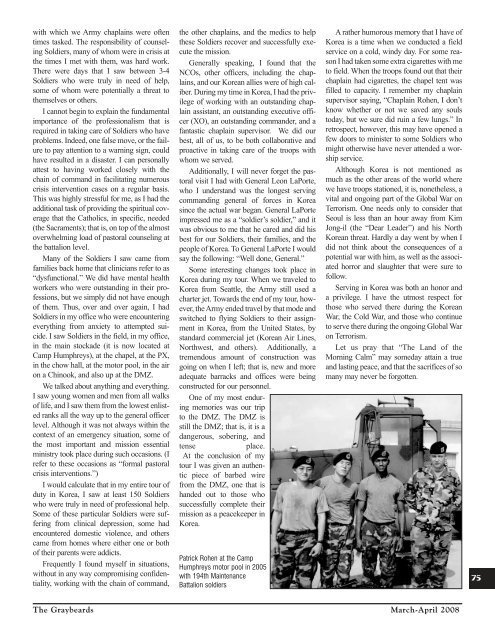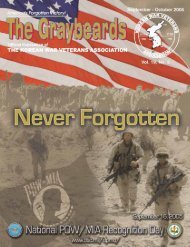Vote! Vote! Vote! - Korean War Veterans Association
Vote! Vote! Vote! - Korean War Veterans Association
Vote! Vote! Vote! - Korean War Veterans Association
You also want an ePaper? Increase the reach of your titles
YUMPU automatically turns print PDFs into web optimized ePapers that Google loves.
with which we Army chaplains were often<br />
times tasked. The responsibility of counseling<br />
Soldiers, many of whom were in crisis at<br />
the times I met with them, was hard work.<br />
There were days that I saw between 3-4<br />
Soldiers who were truly in need of help,<br />
some of whom were potentially a threat to<br />
themselves or others.<br />
I cannot begin to explain the fundamental<br />
importance of the professionalism that is<br />
required in taking care of Soldiers who have<br />
problems. Indeed, one false move, or the failure<br />
to pay attention to a warning sign, could<br />
have resulted in a disaster. I can personally<br />
attest to having worked closely with the<br />
chain of command in facilitating numerous<br />
crisis intervention cases on a regular basis.<br />
This was highly stressful for me, as I had the<br />
additional task of providing the spiritual coverage<br />
that the Catholics, in specific, needed<br />
(the Sacraments); that is, on top of the almost<br />
overwhelming load of pastoral counseling at<br />
the battalion level.<br />
Many of the Soldiers I saw came from<br />
families back home that clinicians refer to as<br />
“dysfunctional.” We did have mental health<br />
workers who were outstanding in their professions,<br />
but we simply did not have enough<br />
of them. Thus, over and over again, I had<br />
Soldiers in my office who were encountering<br />
everything from anxiety to attempted suicide.<br />
I saw Soldiers in the field, in my office,<br />
in the main stockade (it is now located at<br />
Camp Humphreys), at the chapel, at the PX,<br />
in the chow hall, at the motor pool, in the air<br />
on a Chinook, and also up at the DMZ.<br />
We talked about anything and everything.<br />
I saw young women and men from all walks<br />
of life, and I saw them from the lowest enlisted<br />
ranks all the way up to the general officer<br />
level. Although it was not always within the<br />
context of an emergency situation, some of<br />
the most important and mission essential<br />
ministry took place during such occasions. (I<br />
refer to these occasions as “formal pastoral<br />
crisis interventions.”)<br />
I would calculate that in my entire tour of<br />
duty in Korea, I saw at least 150 Soldiers<br />
who were truly in need of professional help.<br />
Some of these particular Soldiers were suffering<br />
from clinical depression, some had<br />
encountered domestic violence, and others<br />
came from homes where either one or both<br />
of their parents were addicts.<br />
Frequently I found myself in situations,<br />
without in any way compromising confidentiality,<br />
working with the chain of command,<br />
the other chaplains, and the medics to help<br />
these Soldiers recover and successfully execute<br />
the mission.<br />
Generally speaking, I found that the<br />
NCOs, other officers, including the chaplains,<br />
and our <strong>Korean</strong> allies were of high caliber.<br />
During my time in Korea, I had the privilege<br />
of working with an outstanding chaplain<br />
assistant, an outstanding executive officer<br />
(XO), an outstanding commander, and a<br />
fantastic chaplain supervisor. We did our<br />
best, all of us, to be both collaborative and<br />
proactive in taking care of the troops with<br />
whom we served.<br />
Additionally, I will never forget the pastoral<br />
visit I had with General Leon LaPorte,<br />
who I understand was the longest serving<br />
commanding general of forces in Korea<br />
since the actual war began. General LaPorte<br />
impressed me as a “soldier’s soldier,” and it<br />
was obvious to me that he cared and did his<br />
best for our Soldiers, their families, and the<br />
people of Korea. To General LaPorte I would<br />
say the following: “Well done, General.”<br />
Some interesting changes took place in<br />
Korea during my tour. When we traveled to<br />
Korea from Seattle, the Army still used a<br />
charter jet. Towards the end of my tour, however,<br />
the Army ended travel by that mode and<br />
switched to flying Soldiers to their assignment<br />
in Korea, from the United States, by<br />
standard commercial jet (<strong>Korean</strong> Air Lines,<br />
Northwest, and others). Additionally, a<br />
tremendous amount of construction was<br />
going on when I left; that is, new and more<br />
adequate barracks and offices were being<br />
constructed for our personnel.<br />
One of my most enduring<br />
memories was our trip<br />
to the DMZ. The DMZ is<br />
still the DMZ; that is, it is a<br />
dangerous, sobering, and<br />
tense<br />
place.<br />
At the conclusion of my<br />
tour I was given an authentic<br />
piece of barbed wire<br />
from the DMZ, one that is<br />
handed out to those who<br />
successfully complete their<br />
mission as a peacekeeper in<br />
Korea.<br />
Patrick Rohen at the Camp<br />
Humphreys motor pool in 2005<br />
with 194th Maintenance<br />
Battalion soldiers<br />
A rather humorous memory that I have of<br />
Korea is a time when we conducted a field<br />
service on a cold, windy day. For some reason<br />
I had taken some extra cigarettes with me<br />
to field. When the troops found out that their<br />
chaplain had cigarettes, the chapel tent was<br />
filled to capacity. I remember my chaplain<br />
supervisor saying, “Chaplain Rohen, I don’t<br />
know whether or not we saved any souls<br />
today, but we sure did ruin a few lungs.” In<br />
retrospect, however, this may have opened a<br />
few doors to minister to some Soldiers who<br />
might otherwise have never attended a worship<br />
service.<br />
Although Korea is not mentioned as<br />
much as the other areas of the world where<br />
we have troops stationed, it is, nonetheless, a<br />
vital and ongoing part of the Global <strong>War</strong> on<br />
Terrorism. One needs only to consider that<br />
Seoul is less than an hour away from Kim<br />
Jong-il (the “Dear Leader”) and his North<br />
<strong>Korean</strong> threat. Hardly a day went by when I<br />
did not think about the consequences of a<br />
potential war with him, as well as the associated<br />
horror and slaughter that were sure to<br />
follow.<br />
Serving in Korea was both an honor and<br />
a privilege. I have the utmost respect for<br />
those who served there during the <strong>Korean</strong><br />
<strong>War</strong>, the Cold <strong>War</strong>, and those who continue<br />
to serve there during the ongoing Global <strong>War</strong><br />
on Terrorism.<br />
Let us pray that “The Land of the<br />
Morning Calm” may someday attain a true<br />
and lasting peace, and that the sacrifices of so<br />
many may never be forgotten.<br />
75<br />
The Graybeards March-April 2008

















